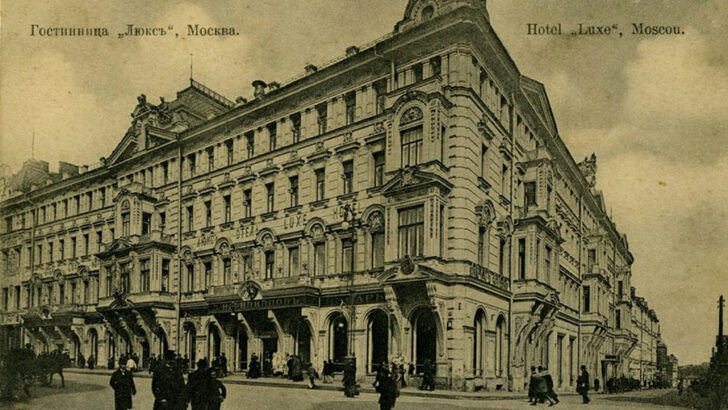Hotel Lux: An Intimate History of Communism’s Forgotten Radicals,
by Maurice J. Casey
(Footnote Press, £20.00 / €24.00)
The Communist International, which became widely known as Comintern, was founded in Moscow 1919. In the tangled politics of the left since 1848 there had been two other international movements, which had failed; but this new organisation was created to gain Moscow control of the universal communist movement in the turbulent post WWI years.
It advocated world communism and was an agent of the Communist Party in Moscow. It promoted and attempted to control and direct Communist parties and governments elsewhere in the world, particularly in Europe.
Revolutionaries
The Hotel Lux, haunt of legendary Marxist revolutionaries, was a large building in Moscow, where those who worked in the Comintern were accommodated, and where the endless meetings beloved of the Left could be held in comfortable salons. It is in the forefront of this narrative by a Belfast based historian, because it was there that May O’Callaghan and Nellie and Rose Cohen cemented their life-long friendship.
May O’Callaghan was born on August 14 1881 in Wexford where her father was the Head Constable in the Royal Irish Constabulary. Soon afterwards, the family moved to Ballinsesker, a village nearby. Following her education locally May travelled to Vienna where she attended the university and subsequently provided public lectures on the writings of Oscar Wilde and George Bernard Shaw.
By 1914 she was sub-editor of Sylvia Pankhurst’s, then recently launched The Woman’s Dreadnought. Later Sylvia Pankhurst placed her in charge of her propagandist People’s Russian Information Bureau.
Thrilled by the fall of the Tsarist Empire, she learned Russian and in 1924 travelled to Moscow. She joined the staff of the Comintern as manager of the English translation department and was allocated a room in the Hotel Lux.
Five years later, fearing for her life in the sinister and murderous atmosphere in Moscow, she departed to New York where she acquired work in an organisation promoting Soviet films in the US. A few years later she returned to London where she ended her working life in Collet’s, the then well-known left-wing bookshop on Charing Cross Road. She died in 1973.
Nellie and Rose Cohen were the daughters of Maurice Jacobovsky, a Polish Jew. He had been forced by anti-semitic violence and political persecution to transfer his family from the Tsarist empire to Whitechapel in the East end of London, where the family changed their name to Cohen.
Rose in addition was involved in tasks of a conspiratorial nature, married a comrade and was known to be an admirer of the exiled Leon Trotsky”
The sisters were enthusiastic supporters of Sylvia Pankhurst’s Feminist Movement. Nellie acted as Pankhurst’s personal assistant and was also actively involved in her propagandist Peoples Russian Information Bureau. By 1923 the Cohen sisters were resident in the Hotel Lux and working in the Comintern. Rose in addition was involved in tasks of a conspiratorial nature, married a comrade and was known to be an admirer of the exiled Leon Trotsky (later murdered in Mexico by an agent of Stalin). Nellie returned to London in 1929.
She subsequently married a former English colleague of hers at the Comintern and settled in England. She also had a daughter, named Joyce, whose father was Liam O’Flaherty, the distinguished Irish writer and sometime revolutionary, who had fought in Talbot Street with a workers’ revolutionary group in the early days of our Civil War.
Dominant
The ‘Stalinist Terror’ was a dominant feature in the lives of May and the Cohen sisters. In his successful campaign to seize and retain absolute control over the Communist Party in Russia and later the Soviet Union, Stalin set out to ‘eliminate’ all his enemies or suspected enemies.
As a result of his paranoia one million people were executed by firing squad and another two million were locked up in the Gulag. And a palpable cloud of fear was left hanging over the Soviet Union until the dictator died on March 5 1953.
In 1937 Rose Cohen and her husband, David Petrovsky, were arrested by the NKVD (secret police), taken before a show-trial and executed. At this time also hundreds of acquaintances and friends who May and the sisters knew in the Hotel Lux simply disappeared.
Disillusioned
Seemingly May or the Cohens were not known to have expressed disappointment or to being disillusioned at what became of the ‘New Jerusalem’ to which they had committed their lives!
Author Maurice J. Casey, born in Tipperary, studied at Trinity, Cambridge, and Oxford, and now lectures at Queen’s University in Belfast, where he specialises in the more human aspects of 20th century revolutionary activity in Europe.
Apart from being a fascinating read, his book is a well-written superb piece of historical research into an era whose grim secrets have not all been revealed as yet.


 The Hotel Lux in Moscow, from a contemporary French postcard
The Hotel Lux in Moscow, from a contemporary French postcard 